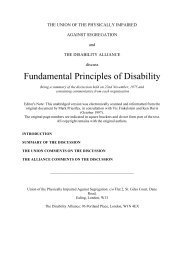Global-Report-Living-Colour-dr2-2
Global-Report-Living-Colour-dr2-2
Global-Report-Living-Colour-dr2-2
You also want an ePaper? Increase the reach of your titles
YUMPU automatically turns print PDFs into web optimized ePapers that Google loves.
64<br />
Inclusive Communities = Stronger Communities<br />
GLOBAL REPORT ON ARTICLE 19: THE RIGHT TO LIVE AND BE INCLUDED IN THE COMMUNITY<br />
concerns about consent and informed decision<br />
making can refuse to provide treatment or service to<br />
the individual. With no decision-making alternative,<br />
families are required to seek guardianship to secure<br />
treatment and/or services.<br />
Where and With Whom<br />
Around the world, people with intellectual disabilities have<br />
been clear that they want to live and be included in their<br />
community in the same ways people without disabilities<br />
are. We know that the vast majority of adults with<br />
intellectual disabilities live at home with their families and<br />
receive little or no support from governments. Residential<br />
institutions continue to exist in a number of countries and<br />
segregated settings which are highly regulated by service<br />
providers and separate different living arrangements<br />
continue to be developed and presented as “community<br />
living” options in many countries. We heard from selfadvocates<br />
and families about some of the reasons why the<br />
residential options have been limited, segregated and<br />
isolating.<br />
Key Issues About Having Options for Where<br />
and With Whom We Live<br />
‰ Families are the Only Source of Support<br />
For the majority of people who have an intellectual<br />
disabilities the only support which they receive in<br />
their day to day lives is from their families. This means<br />
living at home with their families is the only place<br />
they can get the support that they need. Many<br />
governments, even those that have ratified the CRPD,<br />
have failed to provide individualized flexible supports<br />
and services (these supports and services are further<br />
discussed in the next section of this chapter).



